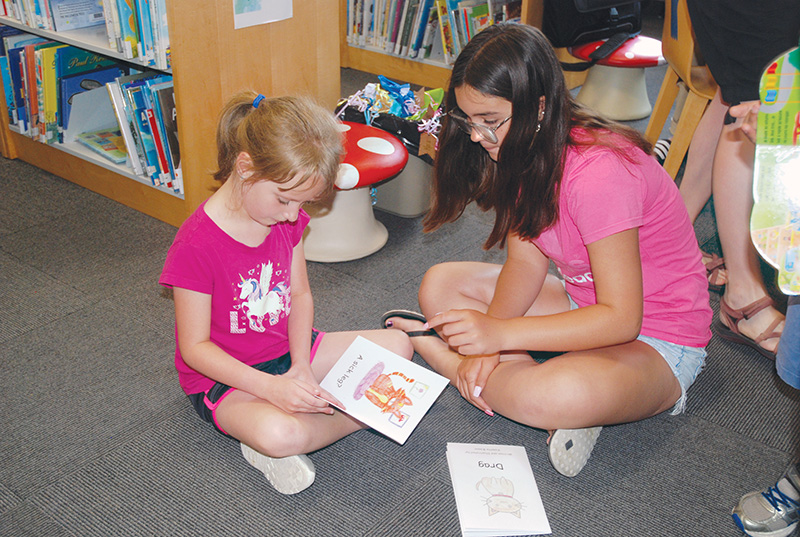Grade 7 student Violette Bisson, on the right shows Cassidy Beaubien from Cambridge Public School how the book works. Morin Photo
RUSSELL – Students at Russell High School had a unique opportunity to mentor their younger counterparts at Russell Public School and Cambridge Public School this year.
The Upper Canada District School Board, (UCDSB) high school students were part of an initiative designed to help children learn to read.
High school students gathered with primary school students from Cambridge and Russell public School on Fri., June 24 at the Russell Public Library.
This would be the first time the high school students would be able to see the results of their role in the Right to Read Program.
Driven by the Ontario Human Rights Commission’s Right to Read Inquiry, the Right to Read initiative involved 49, Grade 7 and Grade 8 students who wrote their own books. The books, referred to as decodable books, are designed to help Kindergarten to Grade 3 students learn to read.
Decodable texts are organized to help children with letter and sound relationships.
The main goal of the project is helping young readers understand phonetics, and how the sounds of different letters combine with the actual letters to enable a child to grasp the concept of reading.
An effective reader has to be able to understand the phonetic code.
Groups of students were given different letters to work with and had to construct sentences using those letters. The resulting sentence was accompanied by a coloured drawing on the same page. The finished books were printed by COBA Studios and Print Shop in Merrickville.
The artwork was done by the students.
The students had help in implementing the project from Nancy Lalonde and Megan Radley both are UCDSB Learning Partners.
“We had two teachers on board who welcomed us into their classrooms to work with the Grade 7 and 8 students. Also, we introduced them to a variety of social justice issues, the Right to Read being one of them. What was interesting right from the beginning was we had students say: “I am 12 years old and what can a 12-year-old do to help kids learn to read. So we introduced them to what codable books were,” Lalonde.
Radley explained, “It began with a Right to Read Inquiry by the Ontario Rights Commission. One of the recommendations was developing a structured literacy program and the need for the explicit teaching of phonics to our early years’ students. So, we brought that forward to the Grade 7 and 8s at Russell High School. Helping them to understand the need to read.”
She said the principal at Russell High School, Peter Onstein brought the idea to his school. It was his idea to bring the idea to the High School.
Student Henry Geno is in Grade 7 at Russell High School, he said “It was difficult at first but the more that we learned what sounds work together and the different levels we had to do it got easier. We learned about merging letters that made a sound when said together like “sh”.
We had to take a bunch of words that had “sh” in them like shoot and shot and put them in our books to try to help them out.”
The program is one the UCDSB is keen to expand based on the results and the positive participation by both teachers and students. The school board is hoping to incorporate real life learning situations into its curriculum.
Ron Ferguson director of education for the UCDSB, school trustee Corina Parisian and executive superintendent Eric Hardie were on hand for the moment when the students would share their reading program with the younger school students.
Ferguson said, “We are in the business of education and at the core of that is learning how to read. It is not acceptable to have students go through elementary school, and not be able to read, so the Upper Canada District School Board has put a massive focus on doing everything we can to ensure students get a good start.
In this project we have older students actually being the ones writing the books. All of the students are super engaged and the little kids are excited about it too.”
Ferguson added that the UCDSB plans to put major emphasis in the years ahead on ensuring that when students leave Grade 6 and go to Grade 7, they have the reading skills that they need to be successful.
“This is just the beginning. Everyone knows this is the foundation to everything else that we do.”
Eric Hardie said, “I think this is tremendous. We have a major focus on literacy at the moment. This is a great example of that work in progress. I think we have a really strong commitment to real world learning. Bringing students out of the classroom and connecting with the broader community. Moving away a little bit from tests, exams, and essays to actually doing what people in the real world do for work.”
Parisian explained, “We have two elementary schools. We have Cambridge and Russell Public School along with high school students, and we’re able to bring those kids to make connections with older mature students that are able to kind of guide them and show them that this is what I get to do in Grade 7. To younger students this is an exciting look at what they will get to do as they progress through the system. It is important to just find activities that target everybody.”
“It is pulling all of their interests together.

Joseph Morin is the Editor of the Eastern Ontario AgriNews, and the Record. He is, despite years of practice, determined to eventually play the guitar properly. He has served the Eastern Ontario community as a news editor, and journalist for the past 25 years with the Iroquois Chieftain, Kemptville Advance, West Carleton Review, and Ottawa Carleton Review in Manotick. He has never met a book he did not like.











